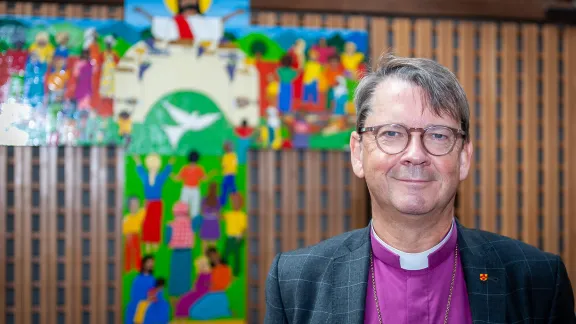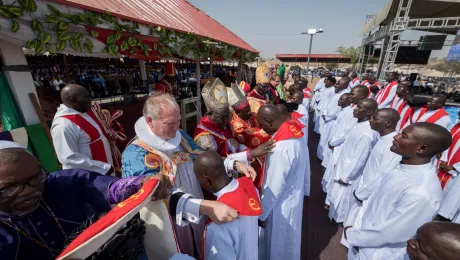
Bishop Johan Tyrberg, Diocese of Lund, Sweden, during a visit to the LWF Communion Office in Geneva, Switzerland, September 2021. Photo: LWF/S. Gallay
Voices from the Communion: Bishop Johan Tyrberg, Diocese of Lund, Sweden
(LWI) – In this Voices from the Communion interview, Bishop Johan Tyrberg, Diocese of Lund, Church of Sweden, looks back at how a historic ecumenical event that put his home city on the global map five years ago continues to change Lutheran-Catholic relations there. He also reflects on his early education, his interest in natural sciences and acting, and finding his way into theological formation, and eventually the pastoral ministry.
Tyberg was the bishop in Lund when the Cathedral of Lund became the venue for the Joint Catholic-Lutheran Commemoration of the Reformation on 31 October 2016 co-hosted by leaders of The Lutheran World Federation (LWF) and the Catholic Church.
Tell us a bit about yourself, growing up?
I grew up in the southern tip of Sweden, not far from Germany. Faith was very important in our home, and we went to church on Sunday. At school I was interested in medical science, acting too, and I took part in theater and drama, especially comedy, I loved being on stage. My father said I was going to be a leader, in business or economics, and for my mother, a minister, probably. Looking back, I can say both of them were right.
What drew you to the church?
When I started studying theology at the Faculty of Theology in the University of Lund, I wanted to stay in the university and become a Bible scholar. In 1987, I traveled with a student’s organization to a mission conference in Colombia, where I met people from around the world. I realized I did not want to stay with the books. I wanted to learn from the books and meet people and take part in their lives. My interest in science would have put me on the path of a medical doctor, I would meet people who are either sick or injured. But in the church, we meet people who are sick and injured but also healthy and the non-injured—all the people. [This] made me try to be a minister and use theology in the church instead of in the university.
You said your journey to ordination was interesting, how?
I still have the curiosity of scientists, but I'm not a scientist, myself. But somehow, I was feeling a push toward working in the parish, and the sense that if knowledge cannot be used in meeting ordinary people, then the knowledge of theology has no use. At my first interview as a candidate for priesthood, the person in the bishop’s office, asked me, “Why do you believe you should be a pastor?” I answered, “I don't know. You tell me.” He was a bit surprised, because normally the students tried to convince why they should be a minister and I did the opposite, I was 21. He laughed, and started to ask all kinds of questions, then said, “You should at least try. I want to see you in action, I want to see you preach.” So, I started to practice, and on 14 January 1990, I was ordained in the Cathedral of Lund, the very cathedral where I now serve as bishop.
Recollections from that day?
It was a powerful service. For me to kneel before the altar, feel the hands of Bishop Per-Olov Ahrén and his assistant, praying for me, to ordain me, and to realize that I am only a very small part in a very long chain of people. For my family, the person who was most touched was my grandmother, on my mother's side—a very humble woman, who did not speak up in public at all. But at the reception afterward, she had a speech: it was very important for her to be there. And my grandfather, her husband, a shoemaker, they lived a very quiet life in a small village. So, for my grandmother to be at the high altar in the cathedral to see her grandson, the first on her family’s side being ordained, I think was bigger for her than it was for me.
My first parish was a very special place, a big congregation, in Staffanstorp. But I was still not convinced that I was supposed to be in this church. So, I applied to be a minister in the archipelago of Karlskrona, to try being in a situation of not having other ministers around to help me, the old-fashioned life as a pastor in Sweden. We moved there with my family for a couple of years, and then Ronneby, Frankfurt am Main and Karlshamn.
Back to your initial plan to become a Bible scholar, and your current role as a pastor and church leader today, what inspires you?
The Bible is actually the main object in where to find the will of God and to understand God, not that we do understand God, but it is the window into the presence of God. In 2021 I have written a book whose title Natten ska vika in Swedish (“The night shall yield”) is from Isaiah 9:1. Human life leads us through times of darkness. We need to know that in the darkness, there is light, and the light is the very presence of God.
You had been Bishop of Lund for two years before the Joint Catholic-Lutheran commemoration of the Reformation on 31 October 2016. What has changed since?
Firstly, the church service in the cathedral on Sunday, 30 October, was almost more touching and moving than the actual day itself. The two local parishes, Catholic and Lutheran, celebrated the ending of the Sunday service together in the Cathedral of Lund. And so many people have also kept talking about that.
It has changed very much since because the Catholic parish and Lutheran Cathedral parish in Lund have started to work together. Sometimes, we have church services together, of course not Holy Communion, but evening prayers, and on several Saturdays. On certain occasions, such as the pilgrimage for the climate, we have started to pray together. And the parish has started to use the Catholic way of having vespers. That is also a way of taking a step further across the door to the neighbor—not only requiring them to do like we do, but we try to pray like they pray. And that has opened new doors and new opportunities.
In some places, for example in Karlskrona, the Church of Sweden sold some of its houses to the Catholic parish. So, the Catholic parish could move from the outskirts of the town to the town center. And I think that would not have happened if it had not been the joint commemoration in 2016. For the rest of the diocese, I would say it has not changed that much, but there is general knowledge of ecumenical work.
On the other hand, we have six Catholic monasteries in the geographic area of our diocese, and four of them are very ecumenical and open to visitors. And I think they have more visitors today from Lutheran communities than they did before. We have also noticed a growth of community life for young people, who join a community for a certain period of time, half a year, two years or three years. Whether it is because of the commemoration or not, I cannot say but we see that change coming. It signifies a longing for a life or prayer, with prayer at the center of taking responsibility for parish life. That is something I welcome very much.
This 31 October, the Catholic congregation and the Lutheran parish in Lund will celebrate five years of a new friendship. It has become the day of ecumenism and peace, which is something to meditate on.
What does it mean for you to be part of the global communion of Lutheran churches?
For me personally, it is wonderful to be part of The Lutheran World Federation, and it is very important to keep in mind our history. It all started in 1947, LWF’s founding in Lund, and the commemoration in 2016. Then long before that, the historic Peace Treaty of Lund (1679). And for that reason, I would say that we have a special responsibility to keep the memory alive and to keep going on the path of peace, to keep working together, ecumenically.
So, this coming 31 October, the Catholic congregation and the Lutheran parish in Lund will celebrate five years of a new friendship. It has become the day of ecumenism and peace, which is something to meditate on.
By LWF/P. Mumia
The Lutheran World Federation is a global body that shares the work and love of Christ in the world. In this series, we profile church leaders and staff as they discuss topical issues and set out ideas for building peace and justice in the world, ensuring the churches and communion grow in witness and strength.


